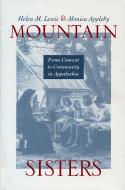 |
MOUNTAIN SISTERS: FROM CONVENT TO COMMUNITY IN APPALACHIA By Helen M. Lewis and Monica Appleby The University Press of Kentucky, 299 pages, $35 |
Reviewed by CAMILLE D’ARIENZO
The setting is the ’60s. The vibrant, creative members of a young religious community have embraced the instructive theology of Vatican II. They rejoice in opportunities to serve people who are poor, ignored and uneducated, people who live on the margins of society. The Glenmary Home Mission Sisters of America believed in their call to devote their lives as women religious in a manner appropriate to their vision. Determined to walk the streets beyond the open doors and windows of the Second Vatican Council with its promise of a renewed, reformed spirituality, they encountered stop signs all along the way. Clerical opposition generated storm clouds, icy rejection and downpours of distrust. Because the church obstructed, rather than guided the women, it became for some a broken rainbow. In 1967, when the religious community was only 26 years old, all but 15 of its 102 members sought dispensations from their vows. Forty-four formed a new community, the Federation of Communities in Service -- FOCIS.
Mountain Sisters is the story of FOCIS. Its authors, Monica Appleby, a former Glenmary Sister and the first president of FOCIS, and Helen Lewis, an Appalachian sociologist and activist, reveal the struggles and successes of former women religious who, while remaining religious women, suffered the loss of support from the institutional church and triumphed in their ability to empower people to forge their own destinies. While staying true to their primary dedication, FOCIS members relinquished many earlier expectations. The original God-centered religious experience, rooted in traditional Catholicism, became, for many, less important than the expressions of self-determination, feminism and liberation -- their own and that of others. Early in their struggle they determined it would be easier to change the world by creating alternative structures rather than by reforming existing ones.
Over the years, their notion of church saw a transformation from a religious denomination, defined by Catholic sacraments, liturgies and limitations to an inclusive church defined by a community without official distinctions. Some members left the faith of their childhood, adopting forms of Protestantism that encouraged and blessed the leadership of women. Others married or formed relationships influenced by the sexual permissiveness of the ’60s. These changes happened gradually. The authors begin one chapter with the admission, “Obedience went first, then chastity, and then poverty.”
What did not go away for FOCIS members and their husbands was the tireless commitment to breathe hope and life into the people of Appalachia and other regions that commanded their attention. Community organization was the overriding methodology that changed systems and established models of spiritual, financial and sociological enrichment. The women entered the worlds they hoped to change and worked along with, not for, those who welcomed them. Out of their collaboration came water systems and paved roads, housing, health care, support against domestic violence, educational, art and music programs, fundraising, factories and restaurants. These provided training and employment to thousands over the years. Industry and attitudes bolstered local pride in culture and heritage, recognition of individual worth that inspired self-determination. Prayer took on new inclusive forms, and the sacraments of their commitment were social services. Although the founding members of Glenmary, in their 1940s origins, must have shared with their contemporaries a “Come, follow me” call from Jesus of the Gospels, Mountain Sisters emphasizes a love affair with the people Jesus cared most about: the weak and wounded of the earth.
Reviewing the history of this remarkable band of committed people, the reader learns that on the one hand, the formation of FOCIS represented a cessation of warfare with an unrelenting hierarchical church. On the other hand, it initiated an unceasing war on poverty, rooted in awareness of the civil rights movement and widespread economic oppression.
Where are the losses?
FOCIS’s relinquishing of institutional support, moral and financial, in some instances slowed the progress and increased the hardship of the new community. The church, in its rejection of the principles of self-determination and egalitarian interaction desired by Glenmary and FOCIS, forfeited a vibrant model of church as promoted by the council documents.
Did the break have to be so complete? Perhaps. Yet the authors, remembering the youthfulness of the membership, wonder what might have happened had the community had older wisdom figures, crones, to offer advice from the wellspring of experience.
Are there lessons for the Catholic church, for other churches? Surely. The book raises up again the terrible waste of dreams denied. It reminds this reader of the first Women’s Ordination Conference held in Detroit over a quarter century ago. What hopes were raised by the speakers there! Mercy Sr. Margaret Farley spoke with conviction of the “moral imperative of the ordination of women.” The findings of Canadian theologians, commissioned by Pope Paul VI, assured the more than a thousand in attendance that there were no scriptural impediments to their ordination. Flares of hope and expectations were like fireworks to the spirits of the faithful! What would the church be like today had that dream been allowed to mature?
And yet, Mountain Sisters pays tribute to the blessings that accompany and burst forth from fidelity to one’s personal integrity. God’s spirit blows where she wills. God blesses perseverance and stands with those who stand with the poor. Whatever the transmutations, that never changes.
Mercy Sr. Camille D’Arienzo is past president of the Leadership Conference of Women Religious and of the Sisters of Mercy in Brooklyn. Her recent audio book, New York Minutes, is a collection of her commentaries for WINS radio in New York.
National Catholic Reporter, February 27, 2004